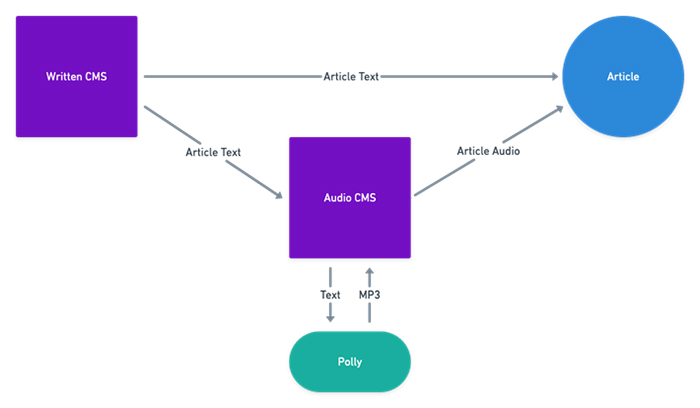Artificial Intelligence
The Washington Post Launches Audio Articles Voiced by Amazon Polly
AWS is excited to announce that The Washington Post is integrating Amazon Polly to provide their readers with audio access to stories across The Post’s entire spectrum of web and mobile platforms, starting with technology stories. Amazon Polly is a service that turns text into lifelike speech, allowing you to create applications that talk, and build entirely new categories of speech-enabled products. Post subscribers live busy lives with limited time to read the news. The goal is to unlock the Post’s world-class written journalism in audio form and give readers a convenient way to stay up to date on the news, like listening while doing other things.
In The Post’s announcement, Kat Down Mulder, managing editor says, “Whether you’re listening to a story while multitasking or absorbing a compelling narrative while on a walk, audio unlocks new opportunities to engage with our journalism in more convenient ways. We saw that trend throughout last year as readers who listened to audio articles on our apps engaged more than three times longer with our content. We’re doubling-down on our commitment to audio and will be experimenting rapidly and boldly in this space. The full integration of Amazon Polly within our publishing ecosystem is a big step that offers readers this powerful convenience feature at scale, while ensuring a high-quality and consistent audio experience across all our platforms for our subscribers and readers.”
Integrating Amazon Polly into The Post’s publishing workflow has been easy and straightforward. When an article is ready for publication, the written content management system (CMS) publishes the text article and simultaneously sends the text to the audio CMS, where the article text is processed by Amazon Polly to produce an audio recording of the article. The audio is delivered as an mp3 and published in conjunction with the written portion of the article.

Figure 1 High-level architecture Washington Post article creation
Last year, The Post began testing article narration using the text-to-speech, accessibility capabilities in iOS and Android operating systems. While there were promising signs around engagement, some noted that the voices sounded robotic. The Post started testing other options and ended up choosing Amazon Polly because of its high-quality automated voices. “We’ve tested users’ perceptions to both human and automated voices and found high levels of satisfaction with Amazon Polly’s offering. Integrating Amazon Polly into our publishing workflow also gives us the ability to offer a consistent listening experience across platforms and experiment with new functions that we believe our subscribers will enjoy.” says Ryan Luu, senior product manager at The Post.
Over the coming months, The Post will be adding voice support for new sections, new languages and better usability. “We plan to introduce new features like more playback controls, text highlighting as you listen, and audio versions of Spanish articles,” said Luu. “We also hope to give readers the ability to create audio playlists to make it easy for subscribers to queue up stories they’re interested in and enjoy that content on the go.”
Amazon Polly is a text-to-speech service that powers audio access to news articles for media publishers like Gannett (the publisher of USA Today), The Globe and Mail (the biggest newspaper in Canada), and leading publishing companies such as BlueToad and Trinity Audio. In addition, Amazon Polly provides natural sounding voices in a variety of languages and personas to give content a voice in other sectors such as education, healthcare, and gaming.
For more information, see What Is Amazon Polly? and log in to the Amazon Polly console to try it out for free. To experience The Post’s new audio articles, listen to the story “Did you get enough steps in today? Maybe one day you’ll ask your ‘smart’ shirt.”
About the Author
 Esther Lee is a Product Manager for AWS Language AI Services. She is passionate about the intersection of technology and education. Out of the office, Esther enjoys long walks along the beach, dinners with friends and friendly rounds of Mahjong.
Esther Lee is a Product Manager for AWS Language AI Services. She is passionate about the intersection of technology and education. Out of the office, Esther enjoys long walks along the beach, dinners with friends and friendly rounds of Mahjong.